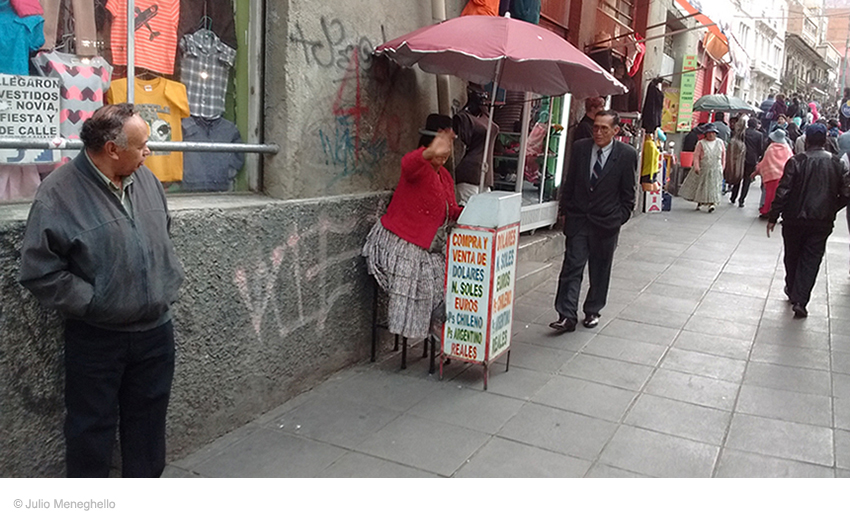Cameras and cel phones
© Guillermo Labarca
A friend of mine wrote to me to tell me about what happened to him while he was in Bolivia. He wrote:
“Walking in the streets of La Paz, suddenly I saw a 'Chola' * that had a great attitude and the location was fine too. Since I was carrying a camera that I took a photo of her without thinking that much, and she protested calling me names in any existing language (I assume that she took me for a 'gringo'). Well, I apologized to her in spanish and then I told her:
- Madam, may a I take a photo of you with my mobile?
- Of course, just shoot.”
My friend thinks that the mobile phone is of so common use that does not intimidate as the cameras do nowadays because of the relation of the cameras with the press and television. I think that it is a reasonable explanation, but I think too that other aspect has to be taken into account, which is the contradictory relationship that cameras and mobile phones have with everyone privacy, We should ask why a camera is perceived as hostile and not a mobile? A key to understand this is to be found in the ill-fated bitter end of Guido Boggiani, an italian born in 1887 that died at the beginning of XX century in Paraguay. He was an ethnographer that explored among isolated tribes in South America, taking photos that he used to show to the natives. He and his assistant were murdered, allegedly, by the indigenous and buried with their heads severed from the bodies. Severing the head from the body prevented, according to the natives, that those men keep doing evil things. It is intriguing that they buried the explorer's camera as well. No doubt because that device did evil too, possibly stole the soul.
In our culture, nowadays, most people rejects too to be photographed unexpectedly with a camera. It is often perceived as a form of harassment. This rejection may be associated with a fear that the photographer seize something that belongs to the subject of the photo: their soul, their identity, their privacy.
Privacy is a luxury that have been present in western societies only in the twentieth century, it did not existed before and it is vanishing real fast, mobiles have strongly contributed to it. We keep trying to protect our privacy, there are even legal rules to protect it, but at the same time, there are no any more forbidden conversation subjects, and we disclose by different means everything we do. Moreover today it is possible to have lots of information about any one, even more if we want to pay for it. Our involvement in the social networks reveals us as never before, but not in the same way as it was when people lived in small towns, cities where everything was at walking distance, or in neighborhoods where everybody was known. It is not anymore the neighbor the one to know where we go, what we buy, with whom we were, what we think, what we eat, but “friends” (most of them we have never met) and a huge amount of unknown people. Neighbors and relatives, that are not “friends” know less about us that those we meet in the social networks.
And all a the information that we upload (mostly with our mobiles) is often accompanied by photos taken with those mobiles. Why we would be afraid of them? This device keep us in touch even if the price is to resign to our own privacy.
Moreover, cameras are associated to prints in paper, it is their natural destiny. They perpetuate experiences. A print is a document, a long-lasting record, a proof of our presence. While the best outcome for the images taken with a mobile is to circulate through the network making ephemeral any event. What happens there does not have durable consequences, happens fast and therefore causes not fear, only a desire to have a more modern one with a more powerful camera.
* Chola – Cholo, is a term used in Bolivia and Peru to designate native and mestizo people.
Depending on the context can be despective, descriptive or affectionate.



